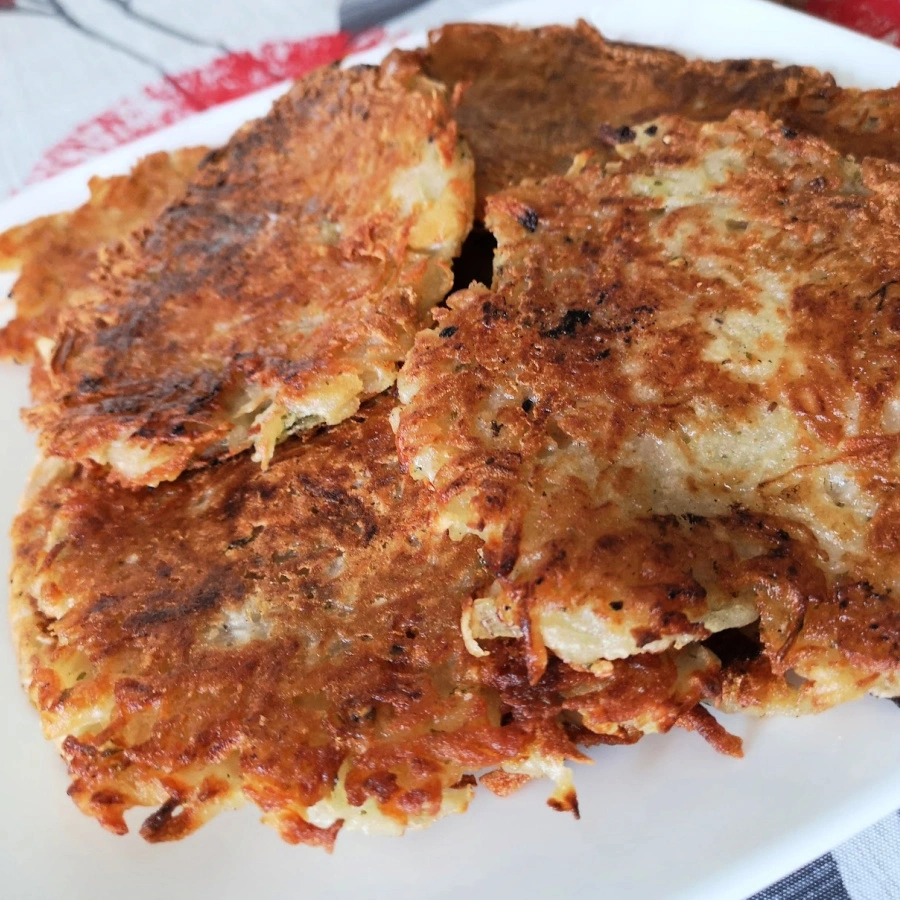- Home
- German Food Guide
- German Potato Pancakes
German Potato Pancakes: Reibekuchen Recipe (Kartoffelpuffer)
By: Gerhild Fulson / Using her extensive experience and cultural knowledge, Oma Gerhild provides trusted, authentic, and easy-to-follow German recipes both here and in her many cookbooks.
German potato pancakes, the authentic reibekuchen, are a traditional dish with deep cultural roots. These crispy, golden potato pancakes have been a staple of German homes and Christmas markets for centuries, enjoyed for their simplicity and heartiness.
Before I dive into the classic potato pancakes recipe I've used for decades, let me first explain a bit of their history, from the potato's introduction to Germany to the popular street food that they've become.
On this page:
The History of German Potato Pancakes
Potatoes were introduced to Germany in the late 1500s, but it wasn’t until the 1700s that they gained widespread popularity, especially in North Rhine-Westphalia, thanks to strange actions taken by Frederick the Great, the King of Prussia, who encouraged their cultivation to combat food shortages.
He saw potatoes as economical, versatile, and nutritious, making them what they now are, an indispensable part of the German diet.
Reibekuchen, meaning “grated cakes,” likely emerged as a practical way to utilize potatoes. By grating and frying them, people made a dish that was filling and super delicious. This tradition spread across regions, with slight variations reflecting local tastes and customs. In rural areas, reibekuchen were often served as a main meal or as the side dish for the main meal, while in urban settings, they became a popular street food.
I grew up with, and then carried on the tradition of, just serving these as the main dish. It was much to my surprise to learn many years later, that in many parts of Germany, they are used as a side dish to many other dishes.
Served with meats and veggies? To me, that seemed really strange. After all, I grew up knowing these as kartoffelpuffer, and Mutti served them with a sprinkling of sugar! And that's how I served them to my family.
By Any Other Name: Reibekuchen or Kartoffelpuffer?
Regional variations for the name, reibekuchen, reflect the linguistic diversity of Germany and the strong local ties to this dish.
- Reibekuchen: the standard High German term, most commonly used nationwide and in written language. It translates directly to “grated cakes” and reflects the preparation method of grating potatoes.
- Kartoffelpuffer: especially in southern and eastern Germany, emphasizes the main ingredient (potatoes or kartoffeln) and the method of frying (puffern loosely translates to “puff up” or “crisp up”).
- Rievkooche: the Rhineland dialect version that's particularly popular in cities like Cologne and Düsseldorf.
- Reiberdatschi: the Bavarian and Swabian term. In Bavaria particularly, this name is common and reflects the regional dialect word datschen, meaning “to press or flatten,” a nod to shaping the pancakes.
- Grumbeerpannekuche: common in parts of the Palatinate (Pfalz), combining the regional word for potatoes (grumbeere, literally “ground berries”) with the word for pancakes (pannekuche).
Regardless of the name, everyone agrees that these crispy, golden pancakes are a staple of German comfort food, especially enjoyed at German Christmas markets.
Reibekuchen and German Christmas Markets
One of the most iconic settings for enjoying potato pancakes as finger food is at Germany’s famous Christmas markets. These bustling, festive gatherings are a feast for the senses, filled with the aroma of mulled wine, roasted chestnuts, and, of course, freshly fried potato pancakes. Vendors typically serve them hot off the griddle, paired with a generous dollop of applesauce—a tradition that highlights the balance between savory and sweet.
However, they aren't just enjoyed during Advent and Christmas, but also throughout the year at weekly markets and fairs. One reason? It's much nicer to fill the outside air with the aroma of frying potato pancakes than smelling up one's own kitchen!!!! I must admit, I'll often look at the weather when I have a craving for making them. A nice windy day helps to air out the house quickly!
Regional Twists on German Potato Pancakes
Reibekuchen’s wide spread popularity is enjoyed across Germany with some of the following regional variations.
- In North Rhine-Westphalia (NRW), they are often paired with a side of apple sauce, a classic combination that balances the savory crispiness of the pancakes with a touch of sweetness.
- In Bavaria, reibekuchen take on a heartier profile, frequently served with quark or sour cream for a creamy tang, and sometimes accompanied by sausages like weißwurst or smoked meats.
- In the Rhineland, these pancakes are enjoyed with a sprinkle of sugar, offering a delightful blend of sweet and savory flavors that’s especially popular at fairs and Christmas markets.
Other regions showcase equally distinctive pairings.
In Saxony, their savory fried potato pancakes are elevated to a sophisticated appetizer when served with smoked salmon or herring and a dollop of horseradish cream. Franconia prefers a tart accompaniment of lingonberry jam, while Hesse adds a fresh twist with the herbal grüne soße.
From serving them with the creamy potato soup of Thuringia to the Scandinavian-inspired pickled herring in Schleswig-Holstein, these regional variations highlight the versatility of these cooked potato pancakes.
Whether served sweet, savory, or somewhere in between, there’s no wrong way to enjoy these traditional treats!

Tips for the Perfect Potato Pancakes
- Starchy varieties like Russet potatoes or Yukon Golds are ideal because they fry up crispier than waxy potatoes.
- Removing excess moisture from the grated potatoes and onions is crucial. Excess water can cause the pancakes to fall apart during frying.
- Frying too many pancakes at once lowers the butter/oil’s temperature, resulting in soggy pancakes. Work in small batches for the best results.
- Reibekuchen are best enjoyed fresh and hot. If you need to keep them warm, place them in a low oven on a wire rack to maintain their crispness.
Use Potato Starch Rather than Flour
Some people prefer to use all-purpose flour instead of potato starch as the binding agent. While flour works, and it's what my Mutti used since she couldn't get potato starch here in Canada when they immigrated in the 1950's, using potato starch has several advantages.
- Potato starch helps create an extra-crispy exterior while keeping the inside tender. It binds the grated potatoes without adding the slight density that flour can bring.
- It's naturally gluten-free, making it a great alternative for those with gluten sensitivities or celiac disease, while still providing excellent binding and texture.
- Since potato starch comes from potatoes, it keeps the natural, earthy flavor of the potatoes.
- It can absorb more moisture than flour, helping to hold the grated potatoes together even more effectively.
If you decide to use flour instead, substitute it in equal measure for the potato starch, or adjust slightly if the batter feels too wet.
How to Keep Potato Pancakes Warm
I recall too often, as I made these for supper, that I'd be standing at the stove cooking and serving them to my family (hubby and 3 boys) as soon as they finished frying. They just taste so much better when they are crisp from the frying pan and haven't gotten soggy by being stacked on top of each other. But that meant that I ate as I was standing at the stove doing the cooking 😉

That was BEFORE I knew I could keep them warm in the oven! This is what I do now:
- Preheat the oven to 200°F (95°C).
- Place a wire rack on a baking sheet to allow air circulation, which prevents the pancakes from becoming soggy.
- As each batch is finished, transfer the pancakes to the wire rack in a single layer. Avoid stacking them to maintain their crispy texture.
- Keep the baking sheet in the oven until all the pancakes are ready to serve.
Ready to make these German Potato Pancakes?
German Potato Pancakes: Reibekuchen Recipe (Kartoffelpuffer)
German Potato Pancakes: Learn how to make the crispy, golden reibekuchen recipe, a traditional dish perfect with applesauce, sour cream, or smoked salmon.
Prep Time20 minutes |
Cook Time20 minutes (frying in batches |
Total Time40 minutes |
Servings:
Makes 4 servings (about 8–10 pancakes, depending upon size)
Ingredients:
- 1½ lb (680 g) of starchy potatoes
- 1 medium onion
- 2 large eggs
- 2–3 tbsp (20–30 g) of potato starch
- ½ tsp salt
- freshly ground black pepper
- 2 to 3 tbsp each of butter and neutral oil for frying (sunflower or canola oil), more if needed
Instructions:
- Preheat the oven to 200°F (95°C) and place two baking sheets with wire racks into the oven.
- Use the fine side of a box grater or a food processor to grate the raw potatoes and onions. Place the grated mixture into a clean kitchen towel and squeeze out as much excess liquid as possible.
- In a large bowl, combine the well-drained potatoes and onions with the eggs, flour, salt, and pepper. Use a wooden spoon or your hands to mix the ingredients. The batter should be slightly sticky, but not overly wet.
- Melt the butter in a heavy-bottomed or non-stick skillet and add the oil over medium-high heat. Test the heat by dropping a small piece of batter into it; it should sizzle immediately.
- Spoon 2–3 tablespoons of the potato mixture into the hot oil in the skillet, forming a small mound. Use the back of the spoon to gently flatten it into a pancake about 3 inches in diameter. Repeat this process, ensuring there’s enough space between each pancake for even frying. Depending upon the size of the skillet, you can do 3 to 4 pancakes at a time.
- Fry each side for about 3–4 minutes, or until the edges are crispy and golden brown. Adjust the burner to a medium heat as needed to prevent burning. Add more butter and/oil as needed.
- Transfer the pancakes to a plate lined with paper towels to absorb excess oil, and then onto the wire rack in the preheated oven.
- Repeat with remaining potato mixture until all is used. Serve potato pancakes immediately.
Notes/Hints:
- The best potatoes to use are Russet or Yukon Gold potatoes
- You can omit the grated onion if you wish.
- If the potato mixture is too liquid, add some more of the starch binder, such as potato starch or all-purpose flour.
- Use a mixture of butter and oil for frying. Adding oil to the butter, helps keeps the butter from burning.
* * * * *
Unless otherwise noted recipe, images and content © Just like Oma | tourmygermany.com


